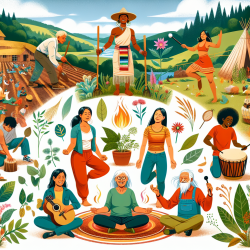In recent years, there has been a growing recognition of the profound impact that traditional land-based activities have on the health and well-being of Indigenous communities. A systematic review titled "The Impact of Land-Based Physical Activity Interventions on Self-Reported Health and Well-Being of Indigenous Adults" sheds light on this important topic. This review highlights the interconnected benefits of engaging in traditional practices, offering valuable insights for practitioners seeking to enhance their skills and understanding.
The Power of Traditional Practices
The systematic review explores how traditional land-based activities, such as hunting, fishing, and ceremonial practices, contribute to the holistic well-being of Indigenous adults. These activities are deeply rooted in cultural identity and provide numerous benefits across physical, spiritual, mental, emotional, and community dimensions.
- Physical Health: Participation in these activities increases physical activity levels and promotes better nutrition through access to traditional foods.
- Spiritual Health: Engaging in ceremonies fosters a deeper connection with cultural heritage and spiritual beliefs.
- Mental and Emotional Health: The sense of freedom and connection to nature reduces stress and enhances emotional well-being.
- Community Engagement: These activities strengthen social bonds and facilitate knowledge transfer between generations.
Navigating Challenges
The review also identifies significant challenges that hinder participation in traditional practices. Colonization has led to regulatory barriers, decreased knowledge transfer, and increased reliance on technology. These factors have contributed to lower participation rates and subsequent health disparities among Indigenous populations.
Practitioners can play a crucial role in addressing these challenges by advocating for culturally relevant interventions that incorporate traditional knowledge. By engaging with community members throughout all stages of intervention development, practitioners can ensure that programs remain respectful and effective.
The Role of Practitioners
Practitioners are encouraged to embrace a "two-eyed seeing" approach that integrates Indigenous knowledge with Western health practices. This complementary approach allows for a more holistic understanding of health and well-being, acknowledging the importance of cultural identity and community engagement.
This approach not only empowers practitioners but also fosters a sense of empowerment within Indigenous communities by validating their cultural practices as integral components of health interventions.
A Call for Further Research
The review highlights the need for more studies exploring community-specific land-based activities. Practitioners are encouraged to engage in further research to identify the most effective ways to integrate these activities into health interventions tailored to specific communities.
The findings from this review underscore the importance of culturally relevant approaches in addressing health disparities among Indigenous populations. By embracing traditional practices and fostering community engagement, practitioners can contribute to more sustainable and impactful health interventions.
This systematic review serves as a valuable resource for practitioners seeking to enhance their understanding of Indigenous health practices. By implementing the outcomes of this research or conducting further studies, practitioners can play a pivotal role in promoting holistic well-being within Indigenous communities.










